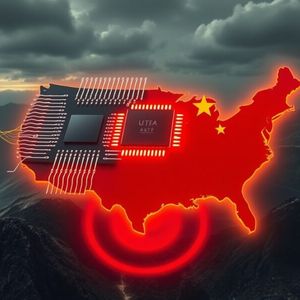Urgent Warning: Why 20 Experts Demand Halt to Nvidia H20 AI Chip Sales to China
6 min read
BitcoinWorld Urgent Warning: Why 20 Experts Demand Halt to Nvidia H20 AI Chip Sales to China In the rapidly evolving landscape of artificial intelligence, where technological supremacy often dictates geopolitical standing, a recent decision by the Trump administration regarding Nvidia H20 advanced AI chips has ignited a firestorm of controversy. For those deeply invested in the digital economy, including the cryptocurrency space, understanding the foundational technologies that power advanced AI models is crucial. The very algorithms and computational power that drive innovations in decentralized finance, blockchain analytics, and predictive market models rely heavily on the kind of sophisticated hardware at the heart of this debate. The stakes are immense, as a group of prominent national security experts argues that allowing the sale of these powerful AI Chips to China represents a critical misstep with far-reaching implications for global power dynamics and the future of technological innovation. The Alarming Call to Restrict Nvidia H20 Sales: A National Security Imperative The controversy began brewing when the Trump administration seemingly gave Nvidia the green light to resume selling its H20 advanced AI chips in China. This decision, however, was met with immediate and forceful opposition from a formidable coalition of 20 national security experts and former government officials. In a strongly worded letter addressed to U.S. Department of Commerce Secretary Howard Lutnick, these experts urged the administration to reverse course, labeling the move a “strategic misstep” that they believe will severely compromise the United States’ critical AI “edge.” This edge, they contend, is vital for both military and civilian applications, impacting everything from defense systems to advanced economic modeling. Among the distinguished signatories were figures like Matt Pottinger, who served as the former deputy national security adviser during Trump’s first term; Stewart Baker, former assistant secretary of Homeland Security under George W. Bush; and David Feith, a former member of the National Security Council. Their collective experience underscores the gravity of their concerns, transforming what might appear to be a simple trade decision into a profound matter of National Security . The letter’s direct challenge highlights a deep division within policy circles regarding the delicate balance between economic interests and strategic technological advantage. Understanding the Potency of Nvidia’s AI Chips : More Than Just “Fourth Best”? At the core of the experts’ alarm lies the true capability of the Nvidia H20 chip. While Secretary Lutnick had previously attempted to downplay the H20, describing it as Nvidia’s “fourth best” AI chip, the experts vehemently disagreed. Their letter unequivocally stated, “The H20 is a potent accelerator of China’s frontier AI capabilities, not an outdated AI chip.” This assertion strikes at the heart of the debate, suggesting that the administration may have fundamentally underestimated the chip’s strategic value. The key to the H20’s power, according to the experts, lies in its optimization for AI inference. What is AI inference? In simple terms, it’s the process where a trained AI model uses new, unseen data to make predictions or decisions. While AI training involves feeding vast amounts of data to a model to “teach” it, inference is about putting that knowledge into action. For instance, in autonomous vehicles, training teaches the car to recognize objects, while inference allows it to identify a stop sign in real-time and react accordingly. The letter specifically highlighted that for inference tasks, the H20 “outperforms even the H100, an AI chip this administration has restricted access to due to its advanced capabilities.” This claim is particularly alarming, as it suggests the H20, despite being designed to skirt export control thresholds, could provide China with a significant boost in deploying and scaling advanced AI applications. Grave Concerns Over China AI Dominance: A Threat to the U.S. Edge? The experts’ concerns extend beyond just the raw power of the Nvidia H20 . They argue that the sale of these chips could directly fuel China AI advancements in ways detrimental to U.S. interests. Their letter raised three critical points: Support for China’s Military: The dual-use nature of advanced AI technology means that chips designed for commercial applications can easily be repurposed for military use. Providing China with cutting-edge inference capabilities could significantly enhance their defense systems, intelligence gathering, and autonomous weaponry development, potentially eroding the U.S.’s military advantage. Worsening U.S. Chip Bottleneck: The global supply chain for advanced semiconductors is already under immense strain, leading to bottlenecks that affect various industries, including domestic AI development. The letter claimed that selling these chips to China would exacerbate the existing AI chip shortage within the U.S., hindering American innovation and competitiveness. Weakening Overall Chip Export Controls: By allowing the H20 to be sold, despite its inference capabilities, the experts fear it sets a dangerous precedent. This could be perceived as a softening of the U.S. stance on technology export controls, making it harder to enforce restrictions on other critical technologies in the future and potentially signaling a lack of resolve. These arguments paint a picture of a decision that, while perhaps intended to ease trade tensions, could inadvertently empower a strategic rival and undermine the very security framework the U.S. seeks to uphold. The Crucial Role of US Export Controls : Setting a Dangerous Precedent? The debate over Nvidia H20 sales brings into sharp focus the critical importance of US Export Controls in safeguarding national interests. The experts’ letter explicitly stated, “The decision to ban H20 exports earlier this year was the right one.” This highlights a perceived inconsistency in the administration’s approach, as the initial ban suggested a clear understanding of the chip’s strategic significance. The subsequent reversal, reportedly linked to ongoing trade discussions with China concerning rare earth elements, has been widely criticized for potentially prioritizing short-term trade concessions over long-term strategic security. The core principle articulated by the experts is unequivocal: “We ask you to stand by that principle and continue blocking the sale of advanced AI chips to China as America works to maintain its technological edge. This is not a question of trade. It is a question of national security.” This statement serves as a powerful reminder that in an era defined by technological competition, the lines between economic policy and defense strategy are increasingly blurred. Effective export controls are not merely about restricting commercial transactions; they are about managing the flow of critical technologies that can confer significant strategic advantages to geopolitical rivals. Why This is a Pivotal Moment for National Security : Protecting America’s Technological Future The plea from these national security experts underscores a profound concern for America’s long-term technological competitiveness and, by extension, its National Security . The very fabric of modern defense, intelligence, and economic power is increasingly intertwined with advancements in AI. Losing the “AI edge” would not only mean falling behind in the development of next-generation technologies but also potentially ceding ground in critical strategic domains. Adding another layer of complexity, this letter emerged just two weeks after the Trump administration unveiled its own AI Action Plan. Ironically, this plan specifically “highlighted the need for U.S. AI chip export restrictions” but remained conspicuously “light on the details of what those export controls would look like.” The experts’ letter can be seen as a direct challenge to this perceived lack of concrete action and a call for consistency between stated policy goals and actual decisions. Their intervention serves as a stark reminder that in the race for AI supremacy, every decision regarding advanced technology exports carries immense weight, shaping not just market dynamics but the very future of global power. The debate surrounding Nvidia H20 sales to China is far more than a commercial dispute; it is a critical battleground in the ongoing technological arms race. The urgent warnings from 20 national security experts highlight the profound implications of allowing advanced AI Chips to reach potential adversaries, risking the erosion of the U.S.’s vital AI edge. As the world moves further into an era dominated by artificial intelligence, the decisions made today regarding US Export Controls will undoubtedly shape the landscape of global power, China AI capabilities, and ultimately, National Security for decades to come. The call to action is clear: prioritize strategic foresight over short-term gains to safeguard America’s technological future. To learn more about the latest AI market trends, explore our article on key developments shaping AI models, features, and institutional adoption. This post Urgent Warning: Why 20 Experts Demand Halt to Nvidia H20 AI Chip Sales to China first appeared on BitcoinWorld and is written by Editorial Team

Source: Bitcoin World



